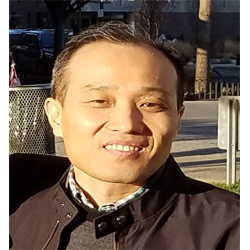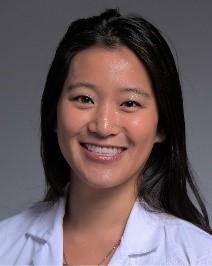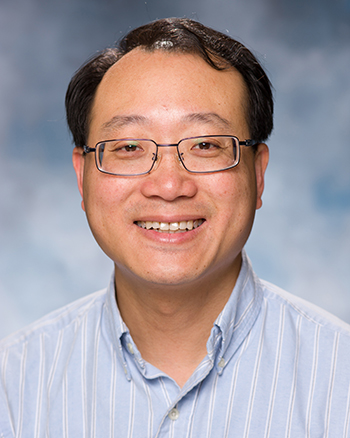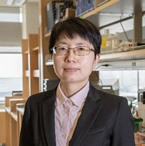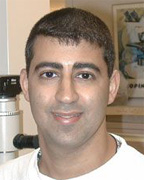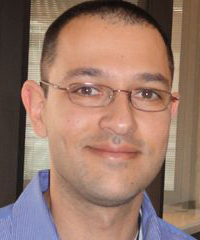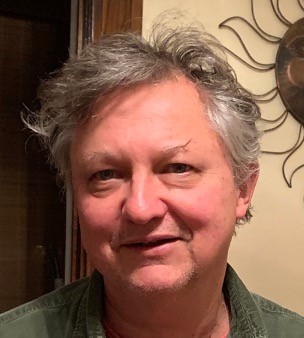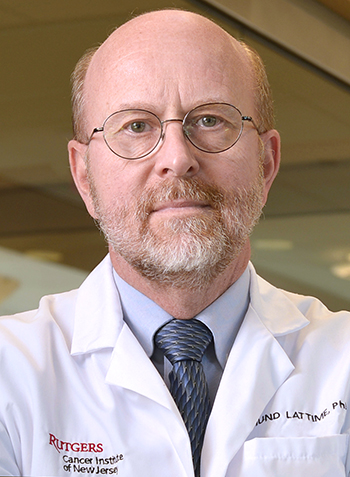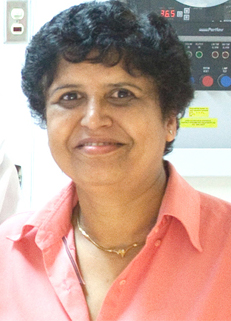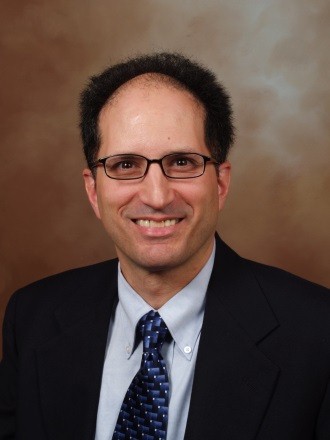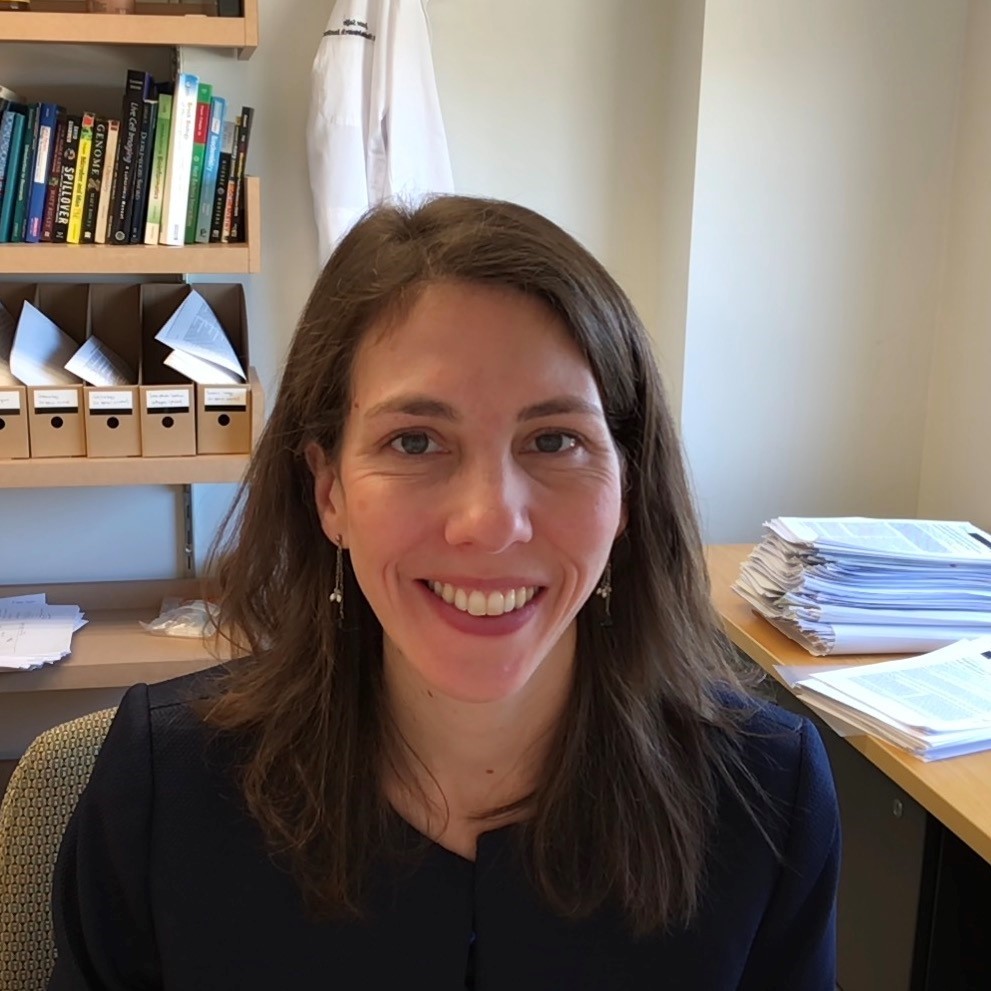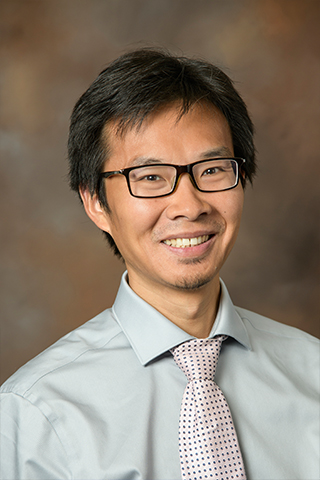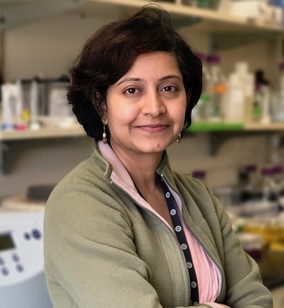Associate Members
Hyung Jin Ahn, PhD
Increasing evidence suggests that cerebrovascular dysfunction is one of the pathological hallmarks of Alzheimer’s disease (AD). AD patients suffer from cerebral microinfarcts and a damaged cerebral vasculature, and a majority of patients with dementia present with both AD and vascular pathologies. Furthermore, some cerebrovascular symptoms such as white matter hyperintensity and carotid artery wave intensity start to increase 5 – 10 years prior to cognitive impairment onset. Circulatory deficiencies could therefore play an important role in AD progression, but the mechanism underlying the vascular contribution to AD is still unclear. Based on this idea, we are investigating the crosstalk between the cerebrovascular system and the nervous system to identify molecular targets and biomarkers underlying cerebrovascular deficits in AD.Department of Pharmacology, Physiology & Neuroscience
New Jersey Medical School
hyungjin.ahn@rutgers.edu
Eddy Arnold, PhD
Board of Governors and Distinguished Professor ofChemistry and Chemical Biology, Rutgers University
arnold@cabm.rutgers.edu
Gaëtan Barbet, PhD
The Barbet laboratory studies the biology of mononuclear phagocytes (MPs) such as monocytes, dendritic cells and macrophages. At the intracellular level, the laboratory is interested in the signaling cascades regulated by calcium homeostasis and how calcium, a ubiquitous second messenger is involved in the different functions of MPs. As innate immune cells, MPs continuously sense their environment and respond adequately to different type of infection or cell death. The laboratory also investigates how MPs interact with other immune cells, especially at the mucosal surfaces.Department of Pediatrics
Robert Wood Johnson Medical School
Principal Investigator, Child Health Institute of New Jersey
gaetan.barbet@rutgers.edu
Kathleen Beebe, MD
Associate ProfessorDepartment of Orthopaedics, Division of Musculoskeletal Oncology
Kathleen.beebe@rutgers.edu
Alex Bekker, MD, PhD
Professor, ChairDepartment of Anesthesiology
Center for Immunity and Inflammation
bekkeray@njms.rutgers.edu
Vivian Bellofatto, PhD
Professor, Interim ChairDepartment of Microbiology, Biochemistry and Molecular Genetics
bellofat@njms.rutgers.edu
Purnima Bhanot, PhD
Associate ProfessorDepartment of Microbiology, Biochemistry and Molecular Genetics
bhanotpu@njms.rutgers.edu
Raymond Birge, PhD
ProfessorDepartment of Microbiology, Biochemistry and Molecular Genetics
birgera@njms.rutgers.edu
Jeffrey M. Boyd, PhD
The Boyd lab is interested in understanding the mechanisms by which the mammalian pathogenic bacterium Staphylococcus aureus survives in infection settings, as well as discovering new methodologies and technologies to prevent or treat infections. We primarily focus our attention on the processes of metal ion homeostasis and the transitions between growth in the presence and absence of oxygen. Since these operations are essential for successful S. aureus infection, we hypothesize that the knowledge gained from understanding the genetic and biochemical underpinnings of these processes can be used to improve infection outcomes. http://dbm.rutgers.edu/pages/Jeff_Boyd.htmlDepartment of Biochemistry and Microbiology
Rutgers University
jeffboyd@SEBS.Rutgers.edu
Yuri Bushkin, PhD
The central focus of my research is cellular immunology and regulation pathways, particularly the mechanisms of antigen presentation to T cells through MHC class I proteins. We extended this investigation field to understand the immune mechanisms underpinning bacterial and viral infections. Recently, we initiated a collaborative research focused on the regulation of inflammation during SARS-CoV-2 infection. The pathologic consequences of severe COVID-19 caused by SARS-CoV-2 include elevated inflammatory responses and dysregulated vascular function associated with thrombosis. This pathology is exacerbated by comorbidities such as diabetes, which is a major risk factor and increases COVID-19 mortality. Our current research is focused on the molecular pathways mediating the pathological outcome of SARS-CoV-2 infection including interactions of hemopoietic cells with endothelium during COVID-19 with or without co-existing diabetes. Host defense mechanisms to viral infections are mainly regulated via interferon responses. Induction of STAT signaling upon SARS-CoV-2 infection down-regulates the function of ACE2 and concomitantly up-regulates activities of CD147 and GRP78 pathways. The latter two components, respectively, are broad key regulators mediating thrombosis, angiogenesis, and endothelial performance. Both SARS-CoV-2 infection and diabetes- affect the ACE2, CD147, and GRP78 signaling pathways. Importantly, CD147 and GRP78 pathways are ubiquitous to many hemopoietic cells, including CD169+ macrophages that are involved in inflammation. Our pilot findings implicate dysregulated expression of these pathways and downstream signaling in SARS-CoV-2-infected macrophages that may contribute to aberrant macrophage-endothelial cell interactions and subsequent thrombosis. This hypothesis is currently tested in a hamster model of pulmonary SARS-CoV-2 infection with or without induced comorbidities. The ultimate goals are to identify the mediators of vascular disease in COVID-19 and diabetes that will provide novel therapeutic targets and biomarkers.Public Health Research Institute
bushkiyu@njms.rutgers.edu
Jian Cao, PhD
how hepatitis B virus causes hepatocellular carcinomaAssistant Professor
Rutgers Cancer Institute of New Jersey
jian.cao@rutgers.edu
Lea Ann Chen, MD
The Chen laboratory is interested in how the gut microbiome impacts human health and disease, with a particular focus on inflammatory bowel disease and C. difficile infections. Our team leverages the understanding of longitudinal microbiome dynamics and high dimensional clinical datasets to explore the etiology and clinical characteristics of inflammatory intestinal disorders.Division of Gastroenterology and Hepatology, Department of Medicine, Department of Pharmacology
Rutgers Robert Wood Johnson Medical School
Director, Inflammatory Bowel Disease Translational Research
leaann.chen@rutgers.edu
Shin-heng Chiou, PhD
Uncovering therapeutic TCRs in solid cancer In contrast to CAR-T cell therapy, T cell receptor (TCR)-engineered T cell therapy has shown tremendous efficacy in treating solid cancer patients with advanced disease. To discover TCRs targeting novel tumor antigens with high functional avidity, we leverage our expertise in the analysis of TCR clonotypes and inference of their antigen specificities. Our group has developed a computational framework that allows us to prioritize candidate TCRs from tens of millions of clonotypes identified in cancer patients based on (1) the probable HLA restriction, (2) availability of TCR alpha/beta chain sequences, and (3) association with favorable patient outcome. In the algorithms used for antigen specificity inference, it is assumed that distinct TCR clonotypes with the same MHC-peptide specificity share a short sequence motif within their CDR3. This enables the discovery of TCR clusters with a shared CDR3 motif and thus quantification of the probability that a given HLA allele is the restricting element for the cluster. Once candidate TCRs are identified, we employ HLA display libraries to further uncover their cognate antigens presented on the HLA allele informed by our analysis. The potential clinical utility of promising TCR candidates will be further explored with our in vivo humanized mouse model.Rutgers Cancer Institute of New Jersey
Robert Wood Johnson Medical School
shinheng.chiou@rutgers.edu
Roberto Colangeli, PhD
Assistant ProfessorDepartment of Medicine
Center for Emerging Pathogens
colangro@njms.rutgers.edu
Lori Covey, PhD
Professor and Dean of Life SciencesCell Biology and Neuroscience
Division of Life Sciences, SAS
covey@dls.rutgers.edu
Lisa Denzin, PhD
Associate ProfessorDepartment of Pediatrics, Child Health Institute, Robert Wood Johnson Medical Group
denzinlk@rutgers.edu
Lisa Dever, MD
Associate Professor, Vice Chair, Director of Fellowship ProgramDepartment of Medicine
deverll@njms.rutgers.edu
Maria Gloria Dominguez-Bello, PhD
Her current lab studies the impacts of modern practices on the microbiome and strategies for restoration, working on gradients of urbanization globally, with synergistic collaborations. Her current interest on lifestyles provides a perspective of diversity to the microbiota across diverse populations. She is also leading the global initiative of the Microbiota Vault, to preserve the diversity of microbes relevant to human health.Department of Biochemistry and Microbiology, SEBS
Department of Anthropology, SAS
Director, NJ Institute for Food, Nutrition and Health (IFNH)
mg.dominguez-bello@rutgers.edu
Richard H. Ebright, PhD
Our lab seeks to understand structures, mechanisms, and regulation of bacterial transcription complexes and to identify, characterize, and develop small-molecule inhibitors of bacterial transcription for application as antituberculosis agents and broad-spectrum antibacterial agents. Our lab uses experimental approaches spanning structural biology, single-moleculDase biophysics, and drug discovery. https://www.waksman.rutgers.edu/ebright/people/dr-richard-h-ebrightChemistry and Chemical Biology
Rutgers University
Laboratory Director, Waksman Institute
ebright@waksman.rutgers.edu
Huizhou Fan, PhD
Associate ProfessorDepartment of Pharmacology, Robert Wood Johnson Medical School
fanhu@rwjms.rutgers.edu
Zhaohui Feng, MD, PhD
Tumor suppressor p53 plays a key role in tumor suppression. To ensure the proper levels and functions of p53 in tumor suppression, p53 is tightly regulated by different mechanisms in cells. Many tumor-associated mutant p53 proteins not only lose the tumor suppressive function of wild-type p53, but also gain new activities in promoting tumorigenesis, which is defined as mutant p53 gain-of-function (GOF). We have long-standing interest in studying p53 signaling pathway and GOF mutant p53 in cancer. Metabolic reprogramming has been regarded as a hallmark of tumor cells and a key contributor to malignant progression. We are also interested in studying how p53 and GOF mutant p53 and other tumor suppressors regulate metabolism to impact tumorigenesis, and how metabolic changes in cancer can be targeted for therapy. We expect that our studies will reveal important mechanisms of p53 and metabolic reprogramming in cancer and identify novel targets and strategies for cancer therapy.https://cinj.org/FengLabDepartment of Radiation Oncology
Department of Pharmacology
Rutgers Cancer Institute of New Jersey
fengzh@cinj.rutgers.edu
Daniel H. Fine, DO
My life with Aggregatibacter actinomycetemcomitans: A low level microbe and social “influencer” with distinctive attributes. My research has centered on studying an oral infectious disease that can have severe consequences in organs distant from the oral cavity. The disease, Localized Aggressive Periodontitis, affects first molars in adolescents and is strongly associated with a specific Gram-negative capnophile, Aggregatibacter actinomycetemcomitans (Aa). The goal of my research is to uncover the molecular, biological, and clinical effects of this distinctive and highly influential oral microbe. Our overall strategy has been to examine Aa on three levels, 1) observational (human longitudinal studies), 2) molecular (in vitro studies), and 3) interventional (animal models that study Aa gene modifications and the effect of these mutated strains on the overall oral and gastrointestinal microbiome). On an observational level we have assessed disease initiation in a longitudinal study of over 2,000 adolescents from Newark who start out healthy and develop disease over a three-year period. In those who developed disease, Aa was found to be necessary but required a consortium of associated microbes in order to initiate disease. Molecular studies have permitted us to dissect Aa virulence genes that alter both innate and acquired immune responsiveness. Finally, Aa with key gene deletions have been inoculated into the oral cavity of primates to study the relationship of wild-type Aa as compared to Aa with gene deletions and their effect on; 1) the initiation of periodontal inflammation and bone destruction at the local level, 2) the modification of the overall microbiome associated with wild type Aa as compared to Aa with gene deletions. Our goal is to pursue strategies for early diagnostic, preventive and therapeutic interventions that could alter the course of local and systemic disease in humans.Department of Oral Biology
Rutgers School of Dental Medicine
finedh@rutgers.edu
Dina M. Fonseca, PhD
I am a tenured professor in the department of Entomology at Rutgers University School of Environmental and Biological Sciences and a member of the graduate programs in Entomology, Ecology and Evolution, Microbiology, and the School of Public Health - https://fonseca-lab.com/. I am also a member of the Rutgers Global Health Institute - https://globalhealth.rutgers.edu/, the Rutgers Climate Institute- https://climatechange.rutgers.edu/ and the Rutgers One Health Steering Committee. I have extensive experience working on the ecological and evolutionary genetics of invasive mosquitoes and ticks and the parasite/pathogens they transmit. In addition to my basic research, I am the Director of the Rutgers Center for Vector Biology - https://vectorbio.rutgers.edu/, a program that provides accreditation, continuing education and broadly supports the extended NJ Mosquito Control community. I also work with residential communities to develop proactive strategies for urban vector (mosquitoes and now also tick) control. I am committed to training better medical entomologists as well as to developing and field-testing enhanced approaches including strategies to prevent and manage the spread of insecticide resistance. I am a founding member of the Worldwide Insecticide resistance Network - https://win-network.ird.fr/, currently represented in 19 institutions worldwide developing vector research. The WIN creates a unique framework for the exchange of new methodologies and samples for tracking insecticide resistance in vectors of arboviruses and other public health pathogens. https://fonseca-lab.comDepartment of Entomology, Graduate Program in Ecology & Evolution, Graduate Program in Microbiology
Rutgers University
Center for Vector Biology
dina.fonseca@rutgers.edu
Nan Gao, PhD
Current research in my laboratory is to understand how human commensal and pathogenic microbes communicate with intestinal mucosal cells, how environmental stressors alter such microbe-host interactions, and how altered microbe-host interactions affect the host susceptibility to inflammatory diseases and cancer. https://sites.rutgers.edu/gao-lab/Associate Professor
Department of Pharmacology, Physiology & Neuroscience
ngao@newark.rutgers.edu
Sunanda Gaur, MD, MBBS
ProfessorDivision of Allergy, Immunology and Infectious Disease, Department of Pediatrics Robert Wood Johnson Medical School
gaursu@rwjms.rutgers.edu
Kristine Gedroic, MD
Adjunct Assistant Professor, Voluntary FacultyDepartment of Anesthesiology
Beatrice Haimovich, PhD
Associate ProfessorDepartment of Surgery
Robert Wood Johnson Medical School
beatrice.haimovich@rutgers.edu
Pingping Hou, PhD
The RTK-RAS-MAPK pathway is the most frequently altered signaling pathway at the rate of 46% across all cancer types. KRAS alternation is the top common event across all samples at 9%, and particularly predominant in pancreatic cancer (72%), colon cancer (69%) and lung cancer (33%). Oncogenic KRAS not only initiates tumorigenesis, but is also required for tumor maintenance, implying KRAS as an ideal therapeutic target for cancer treatment. Due to great advances of targeting RAS achieved in the past decade, KRAS can be druggable now by various methods. However, drug resistance occurs as expected, emphasizing that to overcome KRAS targeted therapy (KRASi) resistance is the key for favorable disease control. Our current projects include understanding tumor cell autonomous and non-autonomous KRASi resistance mechanisms, developing chimeric antigen receptor (CAR) macrophage cell therapy and creating novel safety switches. www.pingpinghoulab.orgAssistant Professor
Center for Cell Signaling
Department of Microbiology, Biochemistry and Molecular Genetics
ph413@njms.rutgers.edu
Scott Kachlany, PhD
Associate ProfessorCenter for Oral Infectious Diseases, School of Dental Medicine
Center for Immunity and Inflammation
kachlasc@sdm.rutgers.edu
Daniel E. Kadouri, MSc, PhD
Associate ProfessorDepartment of Oral Biology, Rutgers School of Dental Medicine
Center for Oral Infectious Diseases
kadourde@sdm.rutgers.edu
Sergei Kotenko, PhD
ProfessorDepartment of Microbiology, Biochemistry and Molecular Genetics
Center for Immunity and Inflammation
kotenkse@njms.rutgers.edu
Alexander W. Kusnecov, PhD
Dr. Kusnecov received his Ph.D. in 1990 from the University of Newcastle, New South Wales, Australia, and pursued postdoctoral research in psychoneuroimmunology in the Department of Psychiatry, University of Rochester Medical School, NY. Subsequently, he was on faculty in the department of Pathology, University of Pittsburgh Medical Center, until his appointment at Rutgers, Department of Psychology in 1998. His field of specialty is focused on functional relationships between the brain and the immune system, with relevance to cognitive and emotional behaviors. His laboratory is interested in how systemic inflammatory mechanisms create stress-like neurobiological adaptations that may promote anti-inflammatory responses. To this end, his current research addresses in murine transgenic models the neurochemical mechanisms (e.g., OFQ/nociceptin) regulating the brain microglial and cytokine responses to chronic inflammatory and psychogenic stressors. Additional research is concerned with maternal immune activation and the development of altered neurobehavioral phenotypes in offspring. He has edited a Handbook of Psychoneuroimmunology, as well as co-authored the book Immune System and Mental Health.Psychology Department
Behavioral and Systems Neuroscience
Rutgers University
kusnecov@psych.rutgers.edu
Jerome Langer, PhD
Associate ProfessorDepartment of Pharmacology
Robert Wood Johnson Medical School
langer@rutgers.edu
Debra L. Laskin, PhD
My research is focused on elucidating inflammatory mechanisms underlying acute injury and disease pathogenesis induced by drugs and toxicants in the lung and the liver. I am specifically interested in macrophages and inflammatory mediators they release. For our studies, we use rodent models of exposure to characterize inflammatory macrophage phenotype and function and biochemical/molecular mechanisms regulating their activity following toxicant exposure. In recent studies we have been analyzing the role of extracellular vesicles and cargo they carry including microRNAs in macrophage activation. The overall goal of my research is to harness the pathologic activity of macrophages and redirect it towards promoting the resolution of inflammation and tissue repair.Roy A. Bowers Endowed Chair
Department of Pharmacology and Toxicology
Ernest Mario School of Pharmacy
Rutgers University
laskin@eohsi.rutgers.edu
Edmund Lattime, PhD
ProfessorSurgery; Biochemistry and Molecular Biology, RWJMS
Associate Director, Education and Training at the Rutgers Cancer Institute of New Jersey
e.lattime@rutgers.edu
Steven Levison, PhD
ProfessorDepartment of Pharmacology, Physiology and Neuroscience
Director, Laboratory for Regenerative Neurobiology
levisosw@njms.rutgers.edu
David Lukac, PhD
Associate ProfessorDepartment of Microbiology, Biochemistry & Molecular Genetics
lukacdm@njms.rutgers.edu
Salvatore AE Marras, PhD
Dr. Salvatore Marras co-developed molecular beacons, one of the first fluorescent nucleic acid hybridization probe technologies. These probes are used for the real-time monitoring of nucleic acid amplification assays, such as polymerase chain reactions (PCR) and isothermal nucleic acid amplification assays, such as the nucleic acid sequence-based amplification (NASBA) and loop-mediated isothermal amplification (LAMP) assays. Real-time amplification enables the detection and quantitative measurement of rare DNA and RNA targets in clinical samples. Furthermore, these assays can be carried out in sealed reaction tubes, thereby preventing the contamination of untested samples. Since fluorescent nucleic acid hybridization probes remain dark when not hybridized to a target sequence, they also enable the detection of DNA and RNA targets in living cells. His research focuses on the different properties of fluorescent hybridization probes, such as design parameters that affect their specificity, and on the effects of interactions between different fluorophore & quencher pairs. His group also develops novel nucleic acid detection methods, including: self-reporting DNA microarray platforms; highly multiplexed, real-time nucleic acid amplification assays for the detection of infectious agents in clinical samples; and extremely sensitive in situ and in vivo hybridization methods, utilizing organic-based fluorescent reporters and metal-based luminescent compounds. More recently, he co-invented the SuperSelective primer technology, which enables the detection and quantitation of somatic mutations, whose presence relates to cancer diagnosis, prognosis, and therapy, in real-time multiplex PCR assays that can potentially analyze rare DNA fragments present in blood samples (liquid biopsies). However, SuperSelective primer applications are not limited to cancer diagnosis as they can be used to identify and quantify any rare mutant DNA fragment in a large background of wild-type DNA fragments, such as multi-drug resistant bacteria and fungi.Department of Microbiology, Biochemistry & Molecular Genetics
Public Health Research Institute
New Jersey Medical School
marrassa@njms.rutgers.edu
J. Patrick O'Connor, PhD
Associate Professor & Vice Chair for Research
Department of Orthopaedics
Center for Immunity and Inflammation
oconnojp@njms.rutgers.edu
Biju Parekkadan, PhD
Associate ProfessorBiomedical Engineering Medicine, School of Engineering
Cancer Institute of New Jersey
biju.parekkadan@rutgers.edu
Nikhat Parveen, PhD
Associate ProfessorDepartment of Microbiology, Biochemistry and Molecular Genetics
Center for Immunity and Inflammation
parveeni@njms.rutgers.edu
Smita S. Patel, PhD
ProfessorDepartment of Biochemistry and Molecular Biology
Robert Wood Johnson Medical School
patelss@rutgers.edu
Kyle K. Payne, PhD
Epithelial ovarian cancer (EOC) remains the most lethal gynecological malignancy in the United States. Implementing immunotherapeutic approaches to treat this disease holds promise, as the ovarian cancer microenvironment is immunologically active; both T cell and B cell infiltration are associated with prolonged patient survival (Zhang*, Conejo-Garcia* et al. N Engl J Med, 2003; Biswas et al. Nature, 2020). However, the microenvironment of ovarian cancer supports unique mechanisms which dampen productive antitumor immunity. This immunosuppressive environment likely explains the typically poor responses to current cancer immunotherapies, and ultimately leads to lethal malignant progression. Thus, the overarching vision of our laboratory is to 1) identify novel immunosuppressive mechanisms in ovarian cancer, and 2) to leverage this knowledge to rationally design the next generation of cancer immunotherapeutics. This builds upon previous work, in association within Dr. Jose Conejo-Garcia, where we elucidated the mechanism of epigenetic regulation of the immune checkpoint molecule, PD-1, in tumor-infiltrating T cells (Stephens*, Payne* et al. Immunity, 2017). We have also recently characterized the immune regulatory molecule, butyrophilin 3A1 (Payne et al. Science, 2020), which was found to dynamically suppress T cells through an N-glycan-mediated mechanism involving CD45 in ovarian cancer beds. Current investigations in the lab are focused on identifying novel cellular stress response pathways intrinsic to both tumor cells and immune cells in order to understand how these responses perturb protective antitumor immunity. To pursue these studies, we utilize unique genetically engineered mouse models, CRISPR/Cas9 screening techniques and targeted gene ablation, transcriptomic, proteomic, and metabolomics-based approaches, as well as clinical specimens and collaborative efforts.Department of Medicine
Robert Wood Johnson Medical School
Section of Cancer Immunotherapy
Rutgers Cancer Institute of New Jersey
kyle.k.payne@rutgers.edu
Daniel S. Pilch, PhD
Associate ProfessorDepartment of Pharmacology
Rutgers Robert Wood Johnson Medical School
pilchds@rwjms.rutgers.edu
Arnold B. Rabson, MD
Professor, Laura Gallagher Chair of Developmental BiologyPediatrics, Pharmacology, Pathology and Laboratory Medicine, RWJMS
Director, The Child Health Institute of New Jersey
rabsonab@rwjms.rutgers.edu
Monica Roth, PhD
ProfessorDepartment of Pharmacology
Robert Wood Johnson Medical School
roth@rwjms.rutgers.edu
Jeanne Salje, PhD
Dr. Salje’s research focuses on understanding how obligate intracellular bacteria interact with their eukaryotic host cells and how this causes disease. Research is primarily focussed on rickettsial organisms, a family of arthropod-borne obligate intracellular bacteria, in particular the mite-borne organism Orientia tsutsugamushi that causes the severe human disease scrub typhus. Dr. Salje’s research is based both at Rutgers, New Jersey and in Bangkok, Thailand, where scrub typhus is endemic. This arrangement ensures rapid translation of advances in fundamental research into clinically relevant outcomes.Adjunct Assistant Professor
Public Health Research Institute
New Jersey Medical School
js2522@njms.rutgers.edu
Derek Sant'Angelo, PhD, MD
ProfessorRWJMS, Department of Pediatrics, Division Chief
Developmental Biology, The Child Health Institute of NJ
santandb@rutgers.edu
Thomas F. Scanlin Jr., MD
ProfessorRobert Wood Johnson Medical School Child Health Institute of NJ
Director, Cystic Fibrosis Center
scanlitf@rwjms.rutgers.edu
Stephan Schwander, MD, PhD
Associate ProfessorDepartment of Environmental & Occupational Health, School of Public Health
Director, Center for Global Public Health
schwansk@sph.rutgers.edu
John Siekierka, PhD
Adjunct Assistant ProfessorRWJMS, Department of Biochemistry & Molecular Biology
Jun Wang, PhD
Research in the Wang Laboratory is directed towards developing antivirals targeting emerging and re-emerging viruses, including influenza A and B viruses, enterovirus D68 (EV-D68), EV-A71, coxsackievirus, poliovirus, and the coronaviruses such as SARS-CoV-2. The central theme of the Wang laboratory has been the identification of new drug targets and the development of novel small molecules for use as chemical probes for target validation as well as drug candidates for translational research. For influenza virus, we have developed inhibitors targeting the M2 proton channel (S31N and V27A), the viral polymerase PA-PB1 protein-protein interactions, and the hemagglutinin. For enteroviruses, we have designed inhibitors targeting the viral capsid VP1 protein, the viral 2A protease, the viral 2C protein, and the viral polymerase. For SARS-CoV-2, we recently identified several potent main protease inhibitors and papain-like protease inhibitors. In addition, we are also pursuing host-targeting antivirals to conquer drug resistance. The Wang laboratory consists of the chemistry lab and the biochemistry lab. Techniques implemented in the Wang laboratory include but not limited to structure-based drug design, high-throughput screening, medicinal chemistry, electrophysiology, peptide chemistry, biophysics, and virology. Researchers in the Wang Lab have opportunity to explore all aspects of pre-clinical drug discovery in the same lab starting from molecular-level design to in vivo mouse model studies. https://sites.rutgers.edu/jun-wang-lab/Associate Professor
Department of Medicinal Chemistry
Ernest Mario School of Pharmacy
junwang@pharmacy.rutgers.edu
Nancy Woychik, PhD
ProfessorBiochemistry & Molecular Biology
Robert Wood Johnson Medical School
nancy.woychik@rutgers.edu
Ping Xie, PhD
Associate ProfessorDepartment of Cell Biology and Neuroscience, Division of Life Sciences
School of Arts and Sciences
xie@dls.rutgers.edu
Srujana Samhita Yadavalli, PhD
How do bacteria sense changes in their environment? How do they regulate their gene expression and adapt to different stresses such as exposure to antimicrobial agents? The Yadavalli lab is interested in understanding the regulatory pathways that underlie stress response in bacteria and how these pathways contribute to the emergence of antimicrobial resistance. In addition, my lab will explore the biochemical functions of the growing number of understudied small proteins - a challenging yet exciting new area in bacterial gene regulation networks. We use a variety of tools including high throughput sequencing, single-cell fluorescence microscopy and proteomics as well as classical genetics and microbiology to answer fundamental questions in bacterial stress response. https://www.yadavallilab.org/Department of Genetics
Rutgers University
Waksman Institute of Microbiology
sam.yadavalli@rutgers.edu
Liping Zhao, PhD
Liping Zhao is currently the Eveleigh-Fenton Chair of Applied Microbiology at Department of Biochemistry and Microbiology, School of Environmental and Biological Sciences, Director of Center for Nutrition, Microbiome, and health of New Jersey Institute for Food, Nutrition, and Health, Rutgers University. He is a fellow of the American Academy of Microbiology and a senior fellow of the Canadian Institute for Advanced Research (CIFAR). He serves on Scientific Advisory Board for the Center for Microbiome Research and Education of the American Gastroenterology Association (AGA). He also directs Rutgers Center for Microbiome Analysis. His team has pioneered the approach of applying metagenomics-metabolomics integrated tools and dietary intervention for systems understanding and predictive manipulation of gut microbiota to improve human metabolic health. Following the logic of Koch’s postulates, Liping has found that endotoxin-producing opportunistic pathogens overgrowing in the obese human gut can induce obesity, fatty liver, and insulin resistance when mono-colonized in germfree mice via the endotoxin-TLR4 pathway as the initiating molecular crosstalk. Their clinical trials published in Science and EBioMedicine showed that high dietary fiber modulation of gut microbiota can significantly alleviate metabolic diseases including a genetic form of obesity in children and type 2 diabetes in adults. His team has pioneered a reference-free, genome-centric and ecology-based strategy for microbiome data mining. The Science magazine featured a story on how he combines traditional Chinese medicine and gut microbiota study to understand and fight obesity (Science 336: 1248, http://science.sciencemag.org/content/336/6086/1248)Applied Microbiology
Department of Biochemistry and Microbiology
School of Environmental and Biological Sciences
iping.zhao@rutgers.edu

